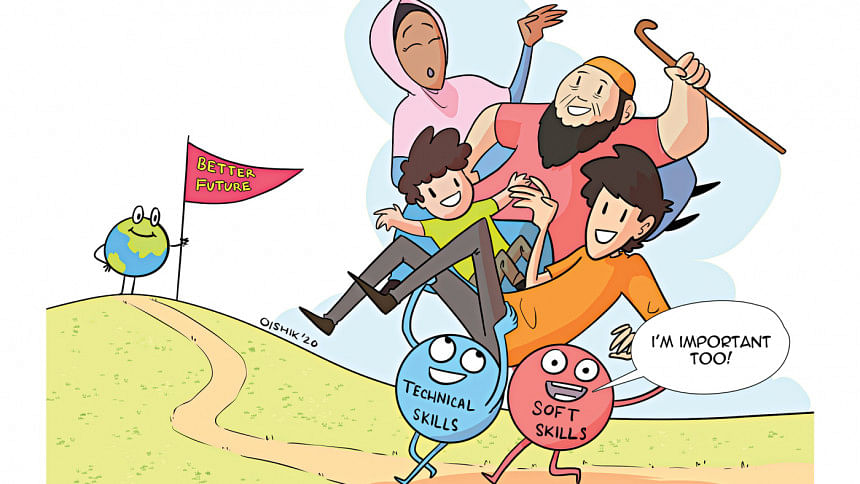Are we forgetting about soft skills?

During the Youth Skills Summit 2020, hosted by The Daily Star to mark World Youth Skills Day, Mahfuz Anam, Editor and Publisher of The Daily Star, talked about the growing lack of empathy and ethics in our daily lives. "We must be efficient. We must earn more, but at the same time, we must become a person with values," he shared. The discussion highlighted that hard skills and values complement each other – there is no point in being highly skilled if we lack core values like honesty and compassion.
Hard or technical skills are teachable abilities that we learn in the classroom, on the job or from other training materials. Soft or interpersonal skills, on the other hand, are subjective abilities that relate to the way we connect to and interact with each other. They are a combination of people skills, social skills and communication skills that revolve around a person's emotional intelligence. Soft skills have little to do with our education and training and more to do with our character, relationships and personality. Although hard skills such as typing speed, machine operation and computer programming are crucial, the question is, are they the only skills we need to build a better future?
Even as we grapple with the coronavirus pandemic, we are experiencing unfair practices in the healthcare industry, hate crimes against minor communities, ongoing wars, environmental crisis and a multitude of other issues. The value of soft skills such as work ethic, effective communication and problem-solving, cannot be understated at this time.
Empathy, an important soft skill, is the ability to identify with another person by relating to their perspective and feelings. It can help us to negotiate better, work well in a team and become more compassionate leaders. Sadly, despite technology allowing us to connect increasingly with our peers, our society, as a whole, is becoming less empathetic.
As more of us are gaining access to the internet and social media, hate speech, bullying and threats are on the rise, because more often than not, we lack tolerance and respect for viewpoints and ideologies that differ from those of our own. Our reluctance to accept different opinions and ideas only shows that we still have a long way to go.
A sustainable world not just needs more successful doctors, engineers, businesspersons and professionals. It also needs people who care about their surroundings and those around them. For example, industrialists with good technical skills can help to increase our GDP, bring in foreign remittance and create more jobs, but if they lack empathy, they may increase industrial waste, contributing to the environmental crisis and global warming. Empathetic industrialists need to take precautions to protect the environment, while contributing to the economy.
While our GDP is increasing rapidly, problems like disparities between the rich and the poor, violation of human rights, drug abuse and violence against women and children still persist. No matter what our profession may be, each of us have a responsibility towards the environment, caring about others, respecting others and contributing positively to the world. Ethics, the moral principles that govern the conducting of activities, play a crucial role in this regard.
In Deloitte Global's 2018 Millennial Survey, young workers indicated that the top four skills employers need to ensure long-term success are interpersonal skills, confidence, ethics/ integrity, and critical thinking.
In a developing nation like Bangladesh, technical knowledge is immensely important for the youth. However, in the chase to specialise in technical skills, our lack of attention to soft skills has made them more imperative, in this fast-changing world.
With the fourth industrial revolution knocking at the door, advanced technology will take over a large portion of our existing jobs. To sustain and survive in a world ruled by technology, the only tool we have is our human strengths, like tolerance, adaptability, flexibility, compassion and empathy, which differentiates us from machines. We need to utilise our inherent values to solve problems and build a brighter future for our race and our planet.

 For all latest news, follow The Daily Star's Google News channel.
For all latest news, follow The Daily Star's Google News channel. 



Comments